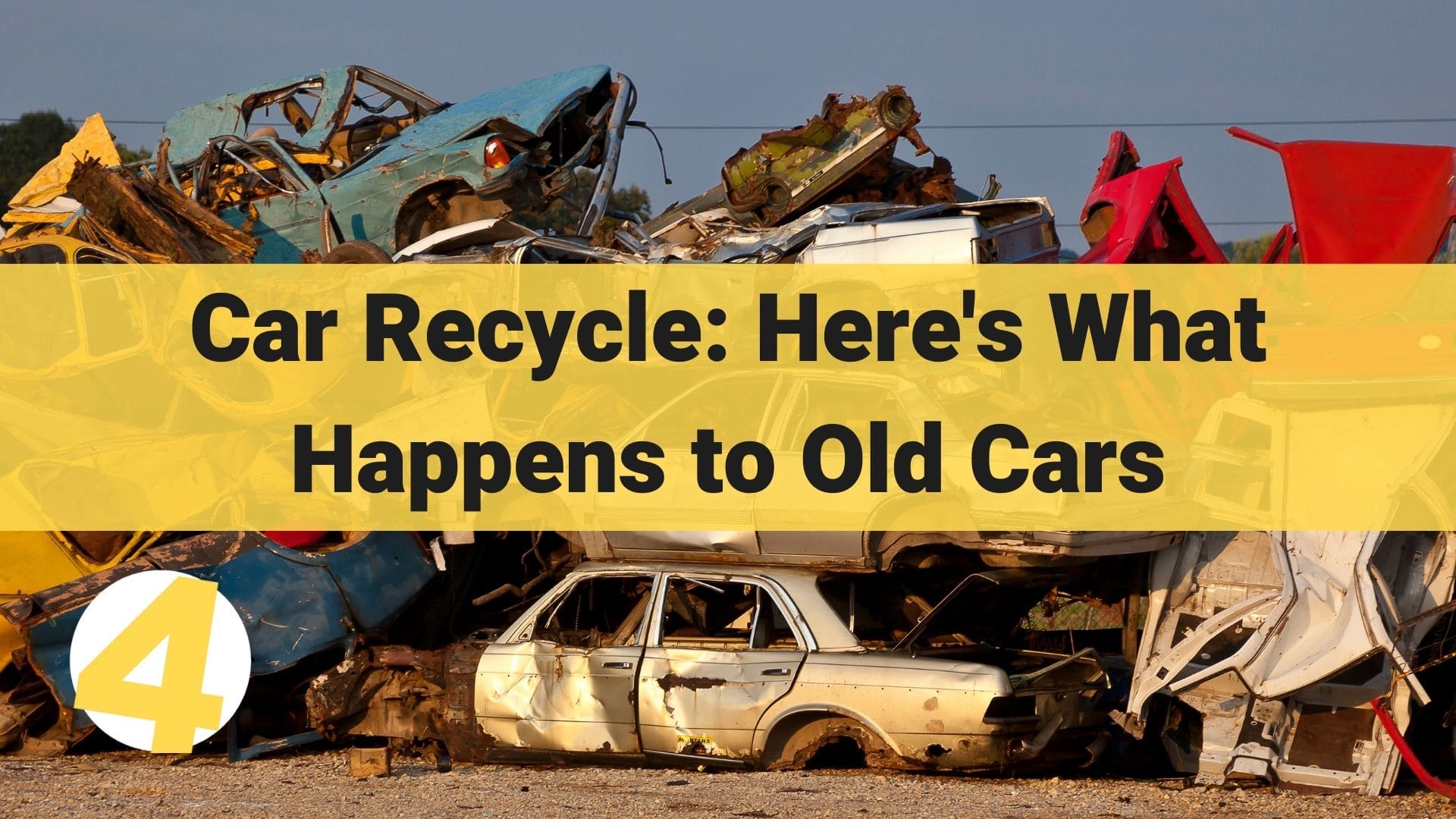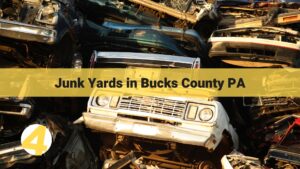Car recycling, or auto recycling, is the eco-friendly process of dismantling end-of-life vehicles to salvage valuable parts and materials. It reduces waste and environmental impact. The process involves depollution, component extraction, and metal recovery.
Ever wondered what becomes of those old clunkers that have seen better days? You know, the car you’ve spent your first few paychecks with but has completely transformed into something that looks like it would ace the lead role in a scrapyard-themed horror movie? Let’s shed some light on car recycling and what happens to old cars, shall we? Buckle up; it’s gonna be a bumpy ride! 🛠️.🚗
Here’s What Happens to Old Cars
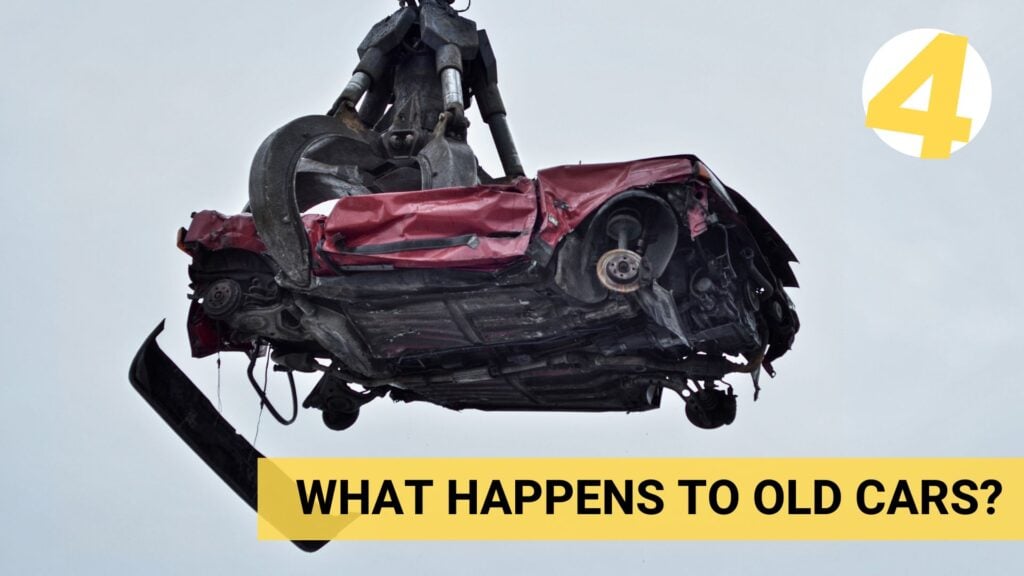
An old car doesn’t simply disappear into oblivion once it reaches its “end-of-life.” Instead, it undergoes an absolute transformation through the car recycling process. A vehicle is made of valuable raw materials, with approximately 75% comprising different metals, including steel and copper. In addition to these elements, a typical vehicle contains components such as plastics, glass, and tires.
Wikipedia cited that in the US alone, a substantial number of vehicles (12 to 15 million estimates) reaching the end of life each year has led to the growth of the vehicle dismantling industry. So, what happens to the car’s components? Take a look:
- Car Batteries
Cars often use lead-acid batteries. After the recycling centers have collected them, the plastic casings and lead plates are removed and cleaned. The lead plates are melted down and purified into lead ingots, which can be used in manufacturing new batteries and other lead-based products. On the other hand, recycled plastic casing can make new battery cases and other plastic products.
- Tires
The tires are shredded into small pieces using powerful machines. The resulting rubber shreds can be used in creating rubberized asphalt for road construction, while others become the raw material for products like playground surfaces and athletic tracks.
- Scrap Metal
After removing reusable components, an old car’s scrap metal is shredded and exposed in high-temperature furnaces until melted. It is cleared of impurities before getting cast into molds of new shapes or products.
- Starters and Alternators
Recyclers perform rigorous testing and refurbishing on the starters and alternators to make sure they meet safety and performance standards. Once refurbished, these components are made available for resale in the automotive aftermarket.
- Oil and Oil Filters
Engine oil is re-refined to remove impurities once the used fluids are drained. This prepares the oil to make it suitable for reuse as lubricating oil. Moreover, recyclers see to it that metal components are filtered. They separate them for further recycling.
- Glass
Glass is separated by type, cleaned, and cleared of contaminants. Recycled glass is used in manufacturing new glass products, such as bottles, fiberglass insulation, and construction materials.
The Car Recycling Process
So how do car batteries, used tires, scrap metals, etc., end up in recycling facilities where they are brought to (new) life? Here’s a look at the process from your parking lot accumulating dust to companies dealing with end-of-life vehicles:
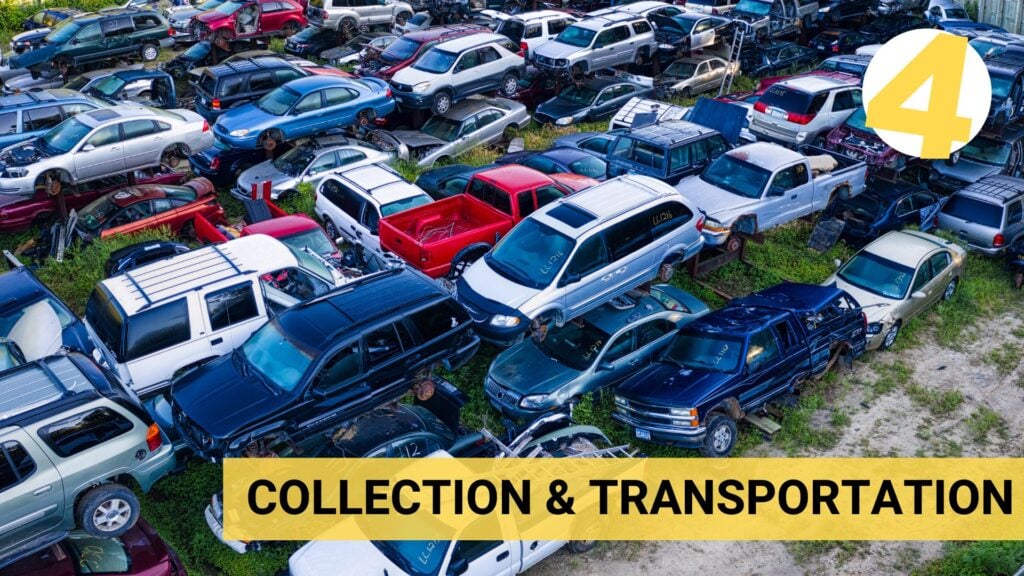
Collection and Transportation of Old Cars
These vehicles come from various sources, like individual car owners, auto auctions, insurance companies, and government impound lots. Collection methods vary, but a common approach is partnerships with towing companies specializing in moving non-running or damaged vehicles.
Once collected, these old cars are transported to licensed auto recycling facilities. The vehicles are brought to a central location where they are recycled.
Preliminary Inspection
Once the old cars arrive at the recycling facility, they go through a thorough preliminary inspection. This step aims to ensure the following:
- Identification of any reusable parts
- Determination of recyclable materials
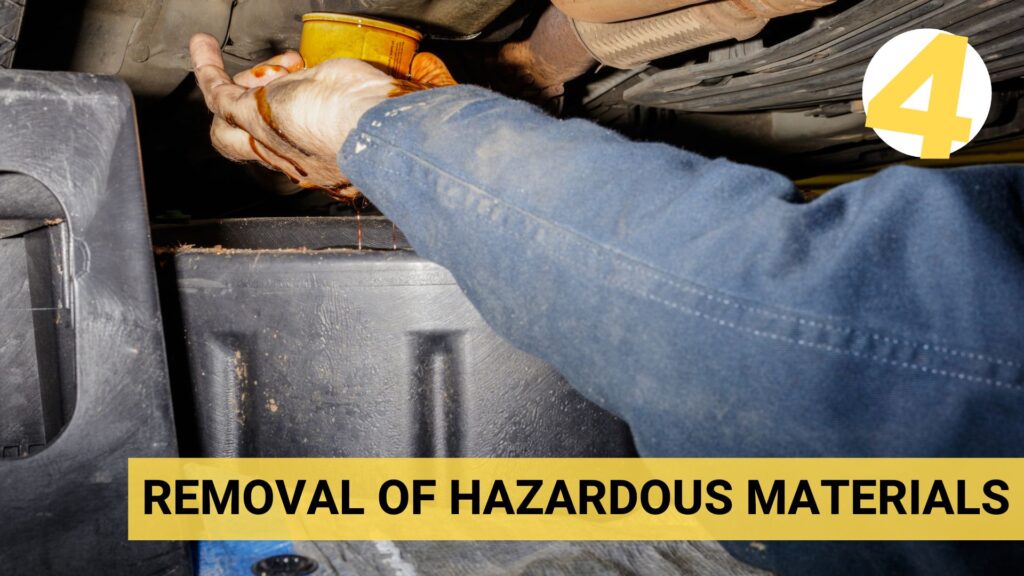
Removal of Hazardous Materials
Once identified, hazardous materials are carefully removed from the vehicles and handled differently depending on their types:
- Fluids. Engine oil, transmission fluid, and other fluids are drained from the vehicle.
- Batteries. They are removed, and the lead and plastic components are separated for recycling.
- Airbags. If the vehicle has airbags, they are removed and safely disposed of. Some airbag modules can be refurbished and reused.
- Mercury switches. Older vehicles may contain mercury switches, often found in convenience lighting systems. These are carefully removed and sent for proper disposal.
It’s worth noting that handling hazardous materials in car recycling is strictly regulated by environmental laws and regulations to ensure that all safety and environmental standards are met. These measures help protect not only the environment but also the health and safety of workers involved in the recycling process.
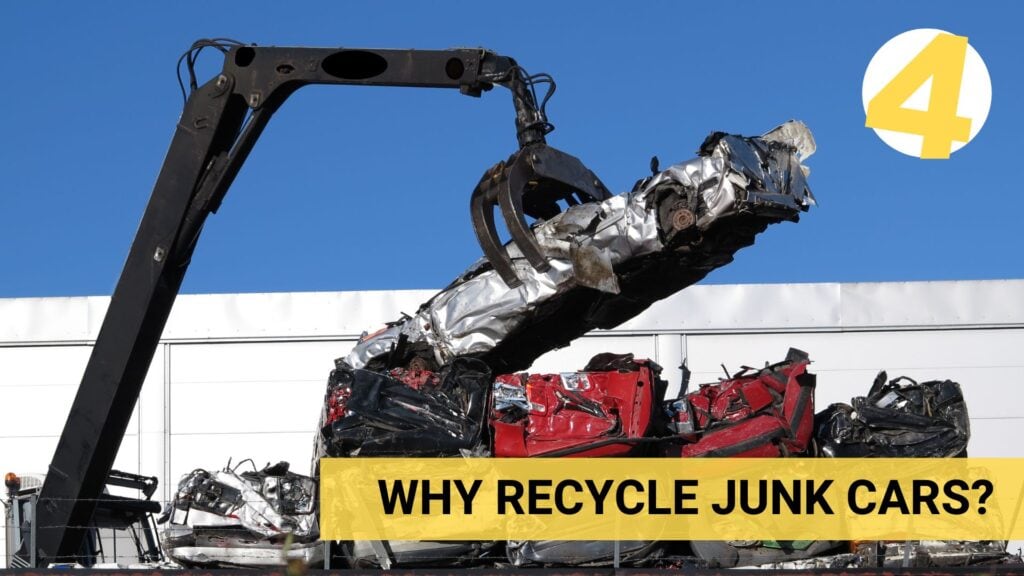
Why Are Cars Recycled?
Car recycling is a showmanship of responsible resource management. It is also a main factor of sustainability and offers many environmental benefits that include the following:
- Energy Conservation
Recycling old cars consumes far less energy than manufacturing new ones. For instance, recycling aluminum, a material commonly found in vehicles, saves up to 95% of the energy required to create aluminum from bauxite ore.
- Reduction in Greenhouse Gas Emissions
Manufacturers reduce the need for energy-intensive extraction and processing of raw materials by using recycled metals in the production of new vehicles. This leads to a considerable reduction in greenhouse gas emissions.
- Resource Efficiency
Recycling extends the lifespan of valuable materials and reduces the need for additional mining and refining. As a result, it conserves natural resources and decreases the environmental degradation associated with resource extraction.
- Lower Carbon Footprint
A recycled vehicle’s overall carbon footprint is significantly lower than a newly manufactured one. This is due to the reduced energy requirements and emissions associated with recycling.
- Less Raw Material Demand
Recycling metals and materials from old cars reduces the pressure to extract these resources from the earth. This helps protect vulnerable ecosystems and preserve biodiversity.
- Energy Savings
The recycling process consumes less energy than producing materials from scratch. For instance, recycling steel saves up to 75% of the energy required for virgin steel production.
- Reduced Waste
Recycling reduces the volume of waste entering landfills or incinerators. This extends the lifespan of landfill sites and mitigates the environmental impact of waste disposal.
- Conservation of Water
The extraction and processing of raw materials often require substantial water usage. Recycling reduces the demand for water in these resource-intensive industries.
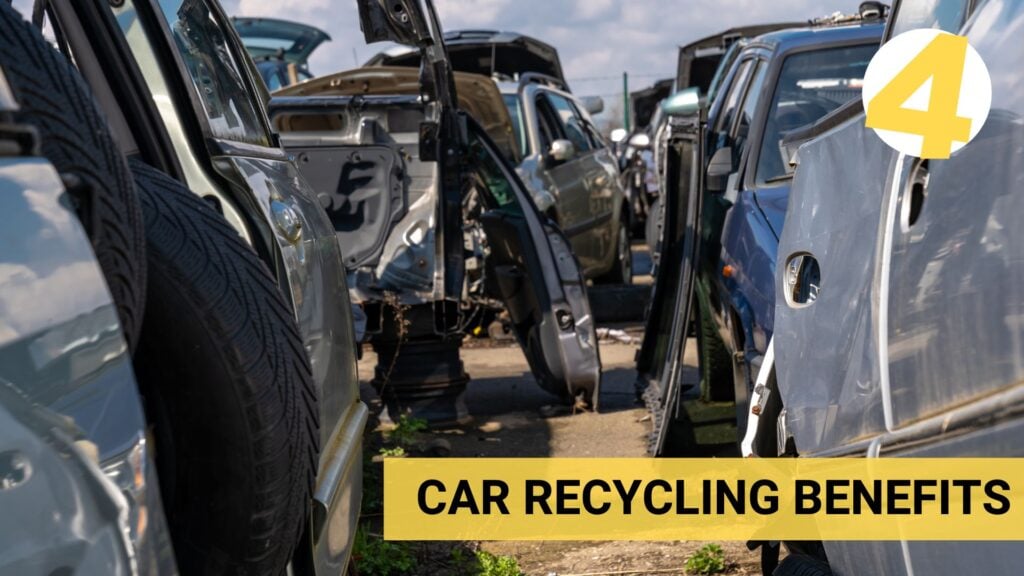
Car Recycling Leading to Lower Demand for New Vehicle Production
The automotive industry has historically been a major consumer of raw materials. The production of new vehicles, which includes manufacturing components like steel bodies, engines, and transmissions, relies on a steady supply of resources. Recycling old cars reduces the demand for new vehicle production through the following:
- Salvaging Reusable Parts
Recycling centers salvage and refurbish parts like engines, transmissions, and electronics from old cars. These components can be reused in other vehicles, extending their lifespan and reducing the need for new parts.
- Recycled Materials in New Vehicles
Recycled metals and materials, such as steel, aluminum, and plastics, are used in manufacturing new vehicles. These recycled materials are often of high quality, which make them suitable for various automotive applications.
- Promoting a Circular Economy
Car recycling contributes to the principles of a circular economy, where products and materials are reused, refurbished, and recycled. This reduces the linear consumption pattern of take-make-dispose, which leads to more sustainable resource use.
- Cost Savings
Using recycled materials can be cost-effective for automakers, which makes it an attractive option for manufacturers looking to reduce production costs while maintaining quality.
Economic Incentives for Car Recycling
Car recycling isn’t just an eco-conscious choice; it can also be financially rewarding. Take a look at the following economic advantages of selling a junk car:
- Scrap Value of Your Vehicle
Even if your old car is no longer roadworthy or has been reduced to a heap of metal, it still has monetary value. The scrap value of your vehicle depends on factors like its weight, type, condition, and the current market price for scrap metal.
- Cash for Junk Cars
Many car recycling facilities, commonly known as scrap yards or salvage yards, are willing to pay cash for junk cars. They assess the value of your vehicle based on its weight and the materials that can be extracted from it, such as steel, aluminum, and other metals.
- Convenience and Extra Income
Selling a junk car for cash is a hassle-free way to declutter your property and earn extra money. It’s an appealing option for individuals looking to get rid of an old car without the hassles of private sales or costly repairs.
- Government Incentives and Recycling Programs
Governments at various levels (local, state, and national) recognize the importance of car recycling in reducing environmental impact. As a result, they often implement incentives and programs to encourage recycling.
Some governments offer “cash for clunkers” programs, where vehicle owners receive financial incentives to trade their old, less fuel-efficient vehicles for newer, more environmentally friendly models. These programs promote the retirement and recycling of older cars.
In some regions, you may be eligible for tax credits or rebates when you recycle your old car or purchase an environmentally friendly vehicle. These incentives aim to reward eco-conscious choices.
Be Part of the Revolution and Turn Your Old Car Into Cash!
So, what’s still stopping you from selling a car you no longer use? If it’s the thought of doing the documentation, handling, towing, and everything else that needs to be accomplished, stop worrying and contact Cash4Cars today.
Cash4Cars offers a convenient and hassle-free way to sell your junk car in Philadelphia. You can request a quote online; if you accept the offer, we will pick up the car from your location. That easy! We will handle everything, and you will get your cash fast. Still in doubt? Grab that phone and make that call. 📱

